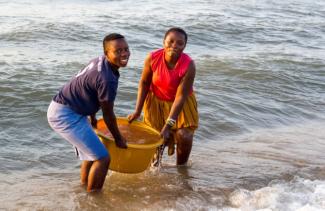IMPROVING AVAILABILITY OF WATER
In Malawi, the scarcity of land resources, high levels of poverty, and a rapidly growing population that is largely dependent on natural resources for subsistence compound these challenges. Heavier rains, less predictable rains, hot spells, and extended dry periods all contribute to making farmers' decisions regarding planting and harvesting more difficult.
In response to the climate changes already observed, farmers have been altering the dates for planting their crops and making use of selected seed for shorter cycle crops. Some are clearing land and planting crops closer to streams and lakes. Farmers are increasing use of Climate Smart Agriculture (CSA) technologies to conserve soil moisture, as well as investing in dry season irrigated vegetable gardens. Many are adopting intercropping and diversifying their crops.

Photo Credit: Health Policy Plus
